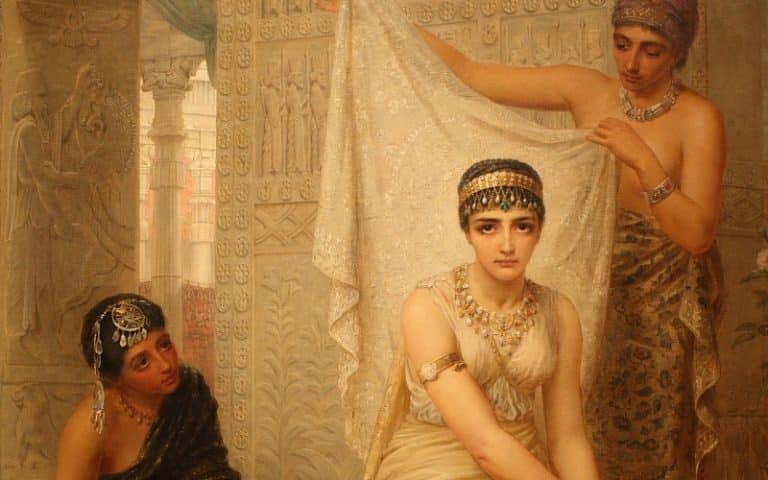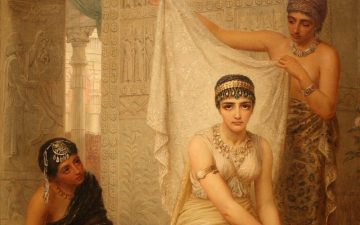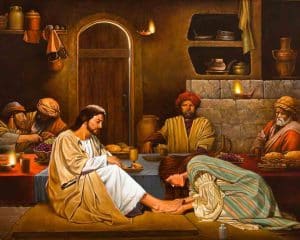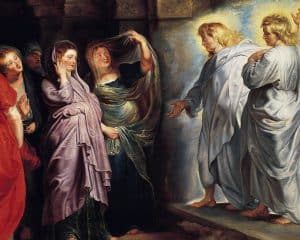 As a bored eight-year-old kid sitting through Sacrament Meeting, I started reading the Bible stories that intrigued me. And I was most intrigued by the stories about women. I remember running my finger down the list of books in the Old Testament and choosing the women’s names: Esther and Ruth. And I wondered why, in that big long book with the impossibly thin pages, there were only two.
As a bored eight-year-old kid sitting through Sacrament Meeting, I started reading the Bible stories that intrigued me. And I was most intrigued by the stories about women. I remember running my finger down the list of books in the Old Testament and choosing the women’s names: Esther and Ruth. And I wondered why, in that big long book with the impossibly thin pages, there were only two.
Ruth bored me; I confess she still bores me, though I now appreciate the tenderness of her story. But Esther was thrilling. Intrigue! Secrets! An evil plot! A Jewish girl who becomes queen! I read it nearly every week. I am still blown away by two things: the rigidness of the book’s patriarchal assumptions and Esther’s daring.
If you aren’t super-familiar with the story, Esther (whose name is really Hadassah) is an orphaned Jewish girl who is raised by her uncle Mordecai. Though the Babylonian captivity ends during her lifetime (the Persian king Cyrus gives the Jews the right to return to Palestine), she stays in Persia with her uncle.
The new king, Xerxes, grows displeased with his queen, Vashti, who refuses to show up to a banquet Xerxes is giving for his friends. (Feminist note: and why should she, anyway? They’re all drunk and he wants to show off his wife’s body.) He’s determined to replace her, and has all the beautiful young virgins in the country show up to his palace. Hadassah goes–she’s apparently very pretty indeed–but changes her name and doesn’t mention to anyone that she’s a Jew. And after lots of royal spa treatments and makeup sessions (seriously, there’s a LOT of this in the Book of Esther) the king chooses her for his harem, and eventually (after more beauty work and some sex) as his queen.
I read all this in the context of LDS meetings where the older folk in my suburban Utah ward warned about the dangers of marrying outside of the faith and where we were told to be “honest, true, chaste, benevolent” while we stood up for right and told people we were Mormons and proud of it. And yet here was Hadassah, doing the most worldly thing I could think of: showing off her body to someone not of her faith, getting chosen for her looks, hiding who she really was.
In retrospect, this may have been the beginning of my cognitive dissonance with the Church. But I digress.
While Esther is queen, something pretty scary happens: a new middleman ruler is named. While Haman is parading around town showing off his new position, Mordecai refuses to bow to him. (Why he refuses to bow is the subject of lots of Jewish thought and writings since; the two main camps seem to be “Haman had an idol on his clothes” and “Haman was making himself into an idol,” but we’re left hanging–certainly Mordecai puts not only himself but also his whole people at risk by refusing to bow.) And Haman reacts just as badly as any other mid-level manager whose authority is questioned: he decides to teach Mordecai a lesson. So he complains to Xerxes that there’s a whole class of people in Persia who don’t follow the king’s laws and asks for the authority to wipe them off the planet. Which Xerxes gives, apparently without stopping to think critically about who these people might be or what Haman might be up to. And Haman ends up sending letters all over the kingdom that say, “Kill all of the Jews on Adar 13th.”
Mordecai shows up at the king’s gate wearing sackcloth and ashes and gets a message to Esther. She’s appalled. There’s a moment where she tries to send him clothes so that he’ll be more presentable; he refuses them. And he tells her, “Don’t think you’re going to escape this, even if you are the queen and live in the palace. Don’t think Haman won’t come for you too.”
Here’s where Esther has to do something. I’ve always thought that she went through the possibilities–should she stay? Should she go? Should she speak up? Or should she just stay quiet about who she really is and save her own neck? Because, remember, she hasn’t told anyone in the palace that she’s a Jew. The chances are good that she could stay hidden, safe, one woman generally indistinguishable in a harem of many. She decides to have Mordecai ask all the Jews to fast for her, and after the three days of fasting she puts on her best clothes and goes in to see Xerxes.
This was the part of the story that got me, every time: she wasn’t allowed to just walk in and talk to the king. She was supposed to wait until he called for her, and he hadn’t called for her in a month. (How could women live like that, I wondered.) Just showing up was a good way to get killed, unless he decided he did want to see her after all.
Xerxes is pleased, but Esther doesn’t push it. All she does is invite him and Haman to a feast the next day, and they go, and they’re thrilled–Haman especially so, because this proves how tight he is with the king and how important he is (really, Haman does a shameless amount of bragging). When Xerxes asks her what she really wants, she invites him to another feast on the following day.
That night, Xerxes can’t sleep. He’s going over the kingdom’s records, and he realizes that some time ago, Mordecai saved his life–he overheard Xerxes’ eunuchs planing to kill him and warned the king before it happened–and he never rewarded him for it. He’s bothered by this. So he asks who’s still awake in the palace, and it turns out that Haman is there, skulking about. He calls Haman in and asks, “What should I do to honor someone who’s done something important for the king?” And Haman, believing it’s a reward for himself, says, “Give him royal robes and a horse that you’ve ridden, and parade him around town.” And Xerxes says, “Make it so, and by the way, the guy is named Mordecai and hes a Jew.”
Which infuriates Haman. He already hated Mordecai, and now he has to treat him like royalty for a day, and he just can’t wait for Adar 13th to roll around so he can get rid of the guy.
The next day, at the second banquet, Xerxes asks Esther to tell him the real reason she’s sought him out. She finally puts her cards on the table: she’s a Jew, as is her uncle Mordecai (I’ve always envisioned Xerxes interrupting at that point to say, “Hey, I know Mordecai, he’s a really good guy,” making Haman even more desperate to kill him), and someone is planning to murder all the Jews. Oh, and by the way, it’s your buddy Haman.
There’s real risk here. Esther doesn’t have any guarantee that Xerxes will side with her. She probably doesn’t even know that the king had Haman parade Mordecai around town on his horse–the women are kept tucked inside the palace. So she’s been going on faith that the Jews have fasted with her and that the king loves her enough to take her word over Haman’s. Which he does, and Haman ends up being hanged on the gallows that he built for Mordecai, and Mordecai is made the next ruler over Haman’s house. So it all ends well for the Jews.
But Esther. Hadassah. This young woman who’s been hiding her identity and is the one person who might be able to influence the king?
I’ll bet she was extra-careful putting on her makeup that morning. I’ll bet she was terrified.
And here’s what I learned from her story, and it probably isn’t what my ward leaders were trying to teach:
Sometimes you have to hide who you really are.
Sometimes it’s better to pretend to be someone else, so that you have a fair shot at greatness. Sometimes you have to lie to the powers that be so that they’ll listen to your message instead of judging you unworthy of giving it.
Don’t let your pride in your position get in the way of you actually doing your job.
The only power women had, in those Biblical ancient days, was soft power: come have lunch with me, and when you’re feeling full and tipsy and happy, I’ll tell you that your best friend wants to annihilate my people.
Women now have much, much more power than Esther did. And we’re still responsible for doing big, important things: changing the way the world works, putting trustworthy people in positions where they can do good. In an age when we don’t have to wait for a king to extend a scepter before we speak, we should take that right with both hands and use it and speak truth and damn the consequences.






11 Responses
Wonderful retelling and thought provoking conclusions!
This is so fabulous, Libby. I love the book of Ruth (infertility issues, women working together for mutual love and survival, Ruth gives Naomi her son!), so confess I had not read much into Esther, compared to Ruth– though like you, I sought out those 2 books in the bible because of the female representation.
But now– I want to go read Esther again and again! You’ve opened my eyes to her real situation, and makes me admire her even more for her intellect and bravery.
Thank you so much for this!
I love this!!!!!!!! Standing for truth and righteousness might involve some unusual tactics.
PREACH! I love your conclusions, and your retelling. Before this, most of my knowledge of this story came from VeggieTales. I’m surprised at how accurate the animated story was, actually.
I love this, Libby, especially your concluding line.
I’ve always loved Esther/Hadassah, and her spunk. Not only courage, but intelligence, and a willingness to work with the resources she has at hand. I have never thought about how much greater voice I have than she did, especially because we don’t have to rely on one person who can get close to a king. We can work together in a way that wasn’t possible in her times.
Thanks for the fresh perspective, Libby 🙂
I was recently asked to depict Esther as part of the ‘Scripture Heroes’ program in our ward’s Primary. (Once a month an adult from the ward dresses up as a scripture character and retells that character’s story for the Primary. The Primary kids LOVE it. The presidency really wanted to get some female characters represented – so far in 2016 it had been all men – and asked me. I was incredibly, incredibly honored.) I fell down the rabbit hole a little bit in researching her story, particularly elements like ‘why did Mordechai refuse to bow before Haman’? I found at least one Jewish scholar who posited that Mordechai made a mistake, and SHOULD have bowed. It was really, really fascinating.
One of the things that jumped out to me was the story of Vashti’s refusal. (Again, I found one interpretation that suggested that Xerxes was asking Vashti to parade around in front of his bros NAKED, which she was well within her rights to refuse.) Interesting that Xerxes and his bros get worried that all the other wives in the kingdom are going to start thinking THEY have the right to say no to THEIR husbands. So these geniuses pass a law stating that wives HAVE to do what their husbands say.
I brought it up in the context of Primary to show that Esther was actually violating TWO laws… one which governed her behavior as the a subject of the King and one which governed her behavior as a wife. I think that’s a point which can get overlooked. (And while the ‘kill all the Jews’ law was eventually repealed, the ‘wives have to do what their husbands say’ law was never mentioned again, so we don’t know if it stayed in effect.)
What was interesting to me was that children as young as Junior Primary could recognize that ‘wives have to do what their husbands say’ was a stupid, stupid law. (Although one little voice piped up, That’s what MY mommy and daddy do!) Seriously, NOTHING that King Xerxes does in the book of Esther is presented of being worthy of emulation. And yet… as recently as the year 1990, when I was a Primary child of eleven, women were REQUIRED to covenant in the temple to OBEY their husbands. Huh.
Thanks for joining the discussion! I love how much scholarship there is on this story, and while I didn’t want to make the post itself unbearably long, I’m very glad you pointed out some of it. (My favorite interpretation is that Mordecai, as a servant in the king’s household, didn’t have to give obeisance to anyone lower than Xerxes.)
Would you consider writing a longer post about Esther for us? I’d love to learn what you’ve discovered!
Oh my gosh, I would love that! I’m so interested in Esther’s story now. Who can I email to get the ball rolling?
[…] like Libby mentioned in her post on Esther, I used to read through the list of books in the standard works seeking out stories about women. […]
[…] up not using, because my audience was 3-to-11-year-olds! After leaving an extremely long comment on Libby’s Esther post, here are some things I’d like to […]